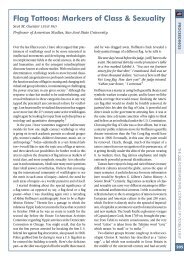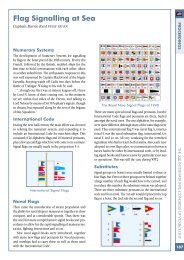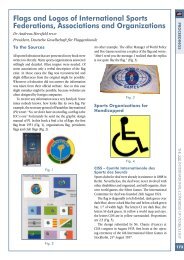The International Brigades in the Spanish War ... - The Flag Institute
The International Brigades in the Spanish War ... - The Flag Institute
The International Brigades in the Spanish War ... - The Flag Institute
You also want an ePaper? Increase the reach of your titles
YUMPU automatically turns print PDFs into web optimized ePapers that Google loves.
PROCEEDINGS<br />
152<br />
Fig. 38 (cont.)<br />
Fig. 39<br />
William Lyon Mackenzie (Dundee, Scotland, 1795<br />
- Toronto, 1861): Mackenzie left his homeland for<br />
Canada <strong>in</strong> 1820. He arrived <strong>in</strong> Montréal, and after<br />
work<strong>in</strong>g on <strong>the</strong> Lach<strong>in</strong>e Canal and as a journalist<br />
for <strong>the</strong> Montreal Herald, he settled <strong>in</strong> York (now<br />
Toronto).<br />
Mackenzie began his public life <strong>in</strong> 1824 when he<br />
founded <strong>the</strong> Colonial Advocate, a reform paper that<br />
openly criticized <strong>the</strong> Family Compact. <strong>The</strong> same year,<br />
he moved his paper to Toronto, where his popularity<br />
soared. Mackenzie was elected to <strong>the</strong> legislature<br />
for <strong>the</strong> first time <strong>in</strong> 1828, represent<strong>in</strong>g York. <strong>The</strong>re,<br />
he demanded reforms <strong>in</strong> <strong>the</strong> areas of agriculture,<br />
commerce and <strong>the</strong> post. His meet<strong>in</strong>g with President<br />
Andrew Jackson dur<strong>in</strong>g a trip to <strong>the</strong> United States <strong>in</strong><br />
1829 was a def<strong>in</strong><strong>in</strong>g moment <strong>in</strong> Mackenzie’s ideological<br />
development. He returned to Upper Canada<br />
filled with admiration for <strong>the</strong> American government,<br />
and became <strong>in</strong>creas<strong>in</strong>gly wary of British colonialism.<br />
W. L. Mackenzie led <strong>the</strong> Rebellion of 1837 <strong>in</strong> Upper<br />
Canada, fight<strong>in</strong>g <strong>the</strong> oligarchy of <strong>the</strong> Family Compact.<br />
His <strong>in</strong>volvement forced him <strong>in</strong>to exile <strong>in</strong> <strong>the</strong> United<br />
States until 1849, when <strong>the</strong> government of United<br />
Canada offered <strong>the</strong> rebels amnesty. He resigned his<br />
seat <strong>in</strong> Parliament <strong>in</strong> 1858. He died <strong>in</strong> comparative<br />
poverty, <strong>in</strong> Toronto, <strong>in</strong> August 1861.<br />
Louis-Joseph Pap<strong>in</strong>eau (1786-1871): In June 1808,<br />
he became a member of <strong>the</strong> Assembly for Kent (Chambly).<br />
He was admitted to <strong>the</strong> Bar of Lower Canada on<br />
May 3, 1810. In 1814, he was elected <strong>in</strong> <strong>the</strong> rid<strong>in</strong>g of<br />
Montreal East as a substitute for his fa<strong>the</strong>r. He represented<br />
this rid<strong>in</strong>g <strong>in</strong> <strong>the</strong> House of Assembly until<br />
March 1832.<br />
He was Speaker of <strong>the</strong> House of Assembly from 1815<br />
to 1823 and from 1825 to 1832. With his forceful<br />
<strong>in</strong>terventions <strong>in</strong> <strong>the</strong> House and his popularity as a<br />
powerful speaker, Louis-Joseph Pap<strong>in</strong>eau became <strong>the</strong><br />
champion of <strong>the</strong> nationalist movement.<br />
As leader of <strong>the</strong> Canadian Party, which later became<br />
<strong>the</strong> Patriot Party, he made an important speech <strong>in</strong><br />
<strong>the</strong> House of Assembly on February 28, 1834, on <strong>the</strong><br />
N<strong>in</strong>ety-two Resolutions. London responded to <strong>the</strong>se<br />
requests with <strong>the</strong> Russell resolutions, which reached<br />
Canada three years later. <strong>The</strong>ir terms only swelled<br />
<strong>the</strong> discontent, and rebellion took shape. Armed<br />
upris<strong>in</strong>gs broke out.<br />
In 1836, warrants were issued for <strong>the</strong> arrest of Louis-<br />
Joseph Pap<strong>in</strong>eau and <strong>the</strong> o<strong>the</strong>r ma<strong>in</strong> leaders of <strong>the</strong><br />
Patriot movement. On December 12, a proclamation<br />
was made offer<strong>in</strong>g $4000 to anyone who brought<br />
Pap<strong>in</strong>eau to justice. He sought refuge <strong>in</strong> Albany, New<br />
York, where he stayed for two years. He moved to<br />
Paris <strong>in</strong> 1839, and stayed <strong>the</strong>re for almost four years.<br />
When he returned to <strong>the</strong> colony, Pap<strong>in</strong>eau was<br />
granted amnesty thanks to <strong>the</strong> <strong>in</strong>fluence of Louis-<br />
Hippolyte La Fonta<strong>in</strong>e. He was re-elected to <strong>the</strong><br />
Parliament of United Canada <strong>in</strong> January 1848 as <strong>the</strong><br />
Member for Sa<strong>in</strong>t-Maurice. In 1852, he was elected<br />
member for Deux-Montagnes. Pap<strong>in</strong>eau retired from<br />
politics <strong>in</strong> 1854. He died at 85 years of age.






